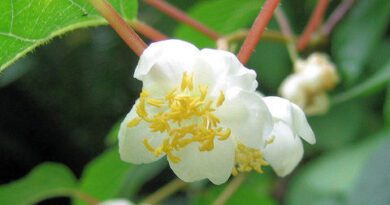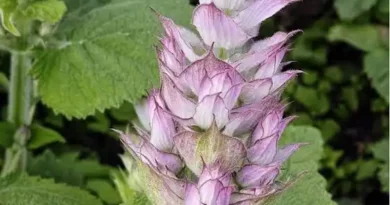19 Medicinal Health Benefits Of Cleavers (Galium aparine)
Cleavers, also known as Galium aparine, belongs to the Rubiaceae family. This annual, herbaceous plant is known for its unique characteristics:
Cleavers have straggling stems that branch out and attach themselves to anything in their way with small hooked hairs that grow out of the leaves and stems. The stems can grow up to two meters in length.
The flowers are white, very small (1mm long and 1-2mm across), and are arranged in small spreading clusters (1-9 flowers) on short side branches. They have four tiny yellow stamens and usually bloom in late spring into summer.
The stalkless leaves are borne in groups of 6-9 at each of the stem joints and they are whorled. They are narrow or lance-shaped with pointed tips and tiny backward-pointing prickles.
The Botanical Description of Cleavers
1. Plant Structure: Cleavers is an annual herbaceous plant characterized by its straggling and climbing nature. The stems are square-shaped and covered with tiny hooked hairs, giving it a velcro-like quality.
2. Leaves: The lance-shaped leaves grow in whorls, typically consisting of six to eight leaves per whorl. These leaves are prominently veined and possess a rough texture.
3. Flowers: Small, white to greenish flowers bloom in clusters, each with four petals. These blooms give way to small, round fruits covered in tiny hooks.
4. Height: Cleavers can reach impressive heights, often standing between 30 to 120 cm tall.
5. Habitat: This resilient plant thrives in various environments, from woodlands and meadows to disturbed areas and gardens.
6. Blooming Period: Cleavers typically blooms in late spring to early summer, adding a touch of delicate beauty to the landscape.
7. Root System: The plant boasts a shallow root system, contributing to its adaptability in different soil types.
8. Botanical Family: Cleavers belongs to the Rubiaceae family, which includes other well-known plants like coffee.
9. Lifecycle: As an annual plant, Cleavers completes its life cycle within a single growing season, from germination to seed production.
10. Ecological Importance: Cleavers plays a role in ecosystems by providing habitat and sustenance for various insects and small animals.
The Geographic Distribution of Cleavers
1. Europe: Cleavers is widespread throughout Europe, thriving in countries like the United Kingdom, France, and Germany.
2. North America: This versatile plant has also found a home in North America, with populations observed in the United States and Canada.
3. Asia: Cleavers can be found in parts of Asia, including Russia and China.
4. Australia: Though not native, Cleavers has made its way to Australia and is present in certain regions.
5. Africa: In Africa, Cleavers is spotted in countries like South Africa and Egypt.
6. New Zealand: Cleavers has adapted to the conditions in New Zealand, showcasing its ability to colonize diverse environments.
7. South America: Some areas in South America, such as Chile, host populations of Cleavers.
8. Scandinavia: The plant is well-distributed in Scandinavia, adding to its global presence.
9. Middle East: Cleavers is documented in parts of the Middle East, including Iran and Israel.
The Chemical Composition of Cleavers
1. Galioside: Cleavers contains galioside, a compound with potential anti-inflammatory properties.
2. Tannins: Tannins are present in Cleavers, contributing to its astringent qualities.
3. Coumarins: The plant contains coumarins, which may have anticoagulant effects.
4. Phenolic Compounds: Cleavers is rich in phenolic compounds, known for their antioxidant properties.
5. Iridoid Glycosides: These compounds, found in Cleavers, are associated with various biological activities, including anti-inflammatory effects.
6. Polysaccharides: Cleavers contains polysaccharides, contributing to its mucilaginous texture.
7. Flavonoids: Flavonoids are present in Cleavers, potentially offering antioxidant and anti-inflammatory benefits.
8. Vitamins: Cleavers is a source of vitamins, including vitamin C, adding to its nutritional value.
9. Minerals: The plant contains minerals like iron and calcium, enhancing its overall nutrient profile.
10. Essential Oils: Cleavers produces essential oils, contributing to its characteristic aroma and potential therapeutic benefits.
11. Alkaloids: Alkaloids are present in Cleavers, with potential effects on the nervous system.
12. Terpenoids: Cleavers contain terpenoids, compounds known for their diverse biological activities.
Read Also: 15 Medicinal Health Benefits Of Calendula (Marigold)
The Medicinal Health Benefits Of Cleavers (Galium aparine)

1. Lymphatic System Support: Cleavers is renowned for its ability to support the lymphatic system, promoting detoxification and drainage.
2. Skin Health: The plant’s anti-inflammatory properties may contribute to improved skin health, addressing conditions like eczema and psoriasis.
3. Urinary Tract Health: Cleavers has diuretic properties that may benefit the urinary tract, supporting kidney function.
4. Anti-Inflammatory Effects: Compounds like galioside and flavonoids contribute to Cleavers’ anti-inflammatory effects, potentially alleviating inflammation.
5. Respiratory Health: Cleavers has been traditionally used to address respiratory issues, such as coughs and congestion.
6. Antioxidant Protection: The presence of phenolic compounds and flavonoids provides Cleavers with antioxidant capabilities, protecting cells from oxidative stress.
7. Joint Health: Cleavers’ potential anti-inflammatory effects may contribute to joint health, offering relief to individuals with arthritis.
8. Blood Purification: The plant’s coumarins and alkaloids may contribute to blood purification, supporting overall cardiovascular health.
9. Wound Healing: Cleavers’ astringent properties may aid in wound healing and the management of minor skin injuries.
10. Immune System Support: Cleavers may support the immune system, thanks to its nutrient-rich composition.
11. Gastrointestinal Health: The mucilaginous nature of Cleavers may contribute to gastrointestinal health, soothing the digestive tract.
12. Antiviral Properties: Some studies suggest that Cleavers may possess antiviral properties, potentially contributing to immune defense.
13. Anti-Cancer Potential: While more research is needed, some compounds in Cleavers show promise in inhibiting cancer cell growth.
14. Liver Health: Cleavers’ detoxifying properties may benefit liver health by aiding in the elimination of toxins.
15. Weight Management: The diuretic and detoxifying properties of Cleavers may support weight management by reducing water retention.
16. Stress Reduction: Cleavers’ potential calming effects may contribute to stress reduction and overall well-being.
17. Menstrual Support: Traditionally, Cleavers has been used to alleviate menstrual discomfort and support a healthy menstrual cycle.
18. Allergy Relief: Cleavers may offer relief from allergies, thanks to its anti-inflammatory and immune-modulating effects.
19. Antifungal Properties: Some constituents in Cleavers may exhibit antifungal properties, making it a potential ally against fungal infections.
The Methods of Usage to Achieve the Provided Health Benefits Of Cleavers (Galium aparine)
1. Tea Infusion: Prepare a soothing tea by infusing dried Cleavers in hot water. This method is ideal for promoting overall health and well-being.
2. Topical Applications: Cleavers can be applied topically in the form of poultices or infused oils to address skin conditions and promote wound healing.
3. Tinctures: Extract the beneficial compounds of Cleavers by creating a tincture, offering a convenient way to incorporate its health benefits.
4. Juicing: Include fresh Cleavers in your juicing routine for a nutrient-packed beverage that supports various aspects of health.
5. Salads and Culinary Use: Cleavers can be added to salads or used as a culinary herb, providing both flavor and potential health benefits.
6. Capsule Supplements: For a more concentrated and controlled intake, Cleavers supplements in capsule form are available.
7. Inhalation: Inhaling the aroma of Cleavers essential oil may offer respiratory benefits and contribute to stress reduction.
8. Compress: Apply a Cleavers-infused compress to areas of inflammation or joint discomfort for localized relief.
9. Smoothies: Incorporate Cleavers into your smoothies for a refreshing and health-boosting beverage.
10. Baths: Add Cleavers to your bath for a relaxing experience that may contribute to skin health and overall well-being.
The Side Effects Of Using Cleavers Medicinal Plant
1. Allergic Reactions: Some individuals may experience allergic reactions to Cleavers, especially if they are sensitive to plants in the Rubiaceae family.
2. Skin Irritation: The hooked hairs on Cleavers’ stems may cause skin irritation in some people, so handling with care is advised.
3. Potential Interactions: Cleavers may interact with certain medications or medical conditions, so it’s crucial to consult a healthcare professional before using it medicinally.
4. Pregnancy and Breastfeeding: Pregnant or breastfeeding individuals should exercise caution, as the effects of Cleavers during these periods are not well-established.
5. Gastrointestinal Discomfort: In some cases, the mucilaginous nature of Cleavers may cause mild gastrointestinal discomfort.
6. Blood Clotting: Due to its potential anticoagulant effects, Cleavers should be used cautiously by individuals taking blood-thinning medications.
7. Hypoglycemia Risk: Cleavers may lower blood sugar levels, posing a risk for individuals with diabetes or those taking medications to control blood sugar.
8. Photosensitivity: Some individuals may experience increased sensitivity to sunlight after using Cleavers, necessitating sun protection.
9. Drug Metabolism: Cleavers may affect the metabolism of certain drugs, potentially altering their effectiveness.
10. Not Recommended for Children: The safety of Cleavers in children is not well-established, so it’s generally not recommended for use in this population.
11. Kidney Disorders: Individuals with kidney disorders should use Cleavers cautiously, as its diuretic effects may impact kidney function.
12. Digestive Upset: In rare cases, Cleavers may cause digestive upset, including nausea or diarrhea.
Read Also: The History and Origin of Burmese Pythons
The Scientific Research and Studies of Cleavers

1. Antioxidant Properties: Research indicates that Cleavers exhibits antioxidant properties, helping combat oxidative stress in the body.
2. Anti-Inflammatory Effects: Scientific studies have explored Cleavers’ potential as an anti-inflammatory agent, suggesting its use in managing inflammatory conditions.
3. Lymphatic System Modulation: Studies suggest that Cleavers may modulate the lymphatic system, promoting detoxification and immune function.
4. Antimicrobial Activity: Research has investigated Cleavers’ antimicrobial activity, showcasing its potential in combating certain microorganisms.
5. Wound Healing: Scientific studies have explored the plant’s role in wound healing, highlighting its potential in supporting skin recovery.
6. Diuretic Effects: Studies indicate Cleavers’ diuretic effects, supporting its traditional use in promoting urinary tract health.
7. Anticancer Potential: Some research suggests that certain compounds in Cleavers may have anticancer potential, although more studies are needed.
8. Immunomodulatory Effects: Scientific investigations have explored Cleavers’ ability to modulate the immune system, potentially enhancing immune responses.
9. Cardiovascular Health: Research indicates that Cleavers may contribute to cardiovascular health by supporting blood purification and circulation.
10. Traditional Use Validation: Scientific studies have sought to validate the traditional uses of Cleavers, providing scientific evidence for its medicinal applications.
The Safety Precautions and Recommendations In Using Cleavers Medicinal Plant
1. Allergic Sensitivity: Individuals with known allergies to the Rubiaceae family should exercise caution when using Cleavers.
2. Skin Contact: Due to the potential for skin irritation from the hooked hairs, it’s advisable to handle Cleavers with care or use protective measures.
3. Consultation with Healthcare Professionals: Before incorporating Cleavers into a medicinal regimen, individuals on medications or with underlying medical conditions should consult healthcare professionals.
4. Pregnancy and Breastfeeding: Pregnant or breastfeeding individuals should avoid Cleavers unless approved by a healthcare provider.
5. Gastrointestinal Upset: Some individuals may experience mild gastrointestinal discomfort, and if so, discontinuation is recommended.
6. Blood Clotting Disorders: Individuals with blood clotting disorders or those taking anticoagulant medications should use Cleavers cautiously.
7. Blood Sugar Management: Individuals with diabetes or those managing blood sugar levels should monitor their levels carefully when using Cleavers.
8. Photosensitivity: Cleavers may increase sensitivity to sunlight, requiring sun protection measures during use.
9. Drug Interactions: Cleavers may interact with certain medications, necessitating professional advice for those on medication regimens.
10. Children’s Usage: Cleavers is generally not recommended for children due to limited safety data.
11. Kidney Disorders: Individuals with kidney disorders should use Cleavers cautiously, monitoring for any adverse effects on kidney function.
12. Digestive Health: If digestive upset occurs, individuals should discontinue Cleavers use and seek advice from a healthcare professional.
FAQs About Cleavers Medicinal Plant
1. Can Cleavers be consumed as a food source? Yes, Cleavers can be added to salads or used in culinary dishes.
2. Is Cleavers safe for pregnant women? Pregnant women should consult their healthcare provider before using Cleavers.
3. How long does it take to experience the health benefits of Cleavers? The timeframe for experiencing benefits varies, and consistency in usage is key.
4. Can Cleavers be used for children’s skin conditions? It is not recommended to use Cleavers on children’s skin without consulting a healthcare professional.
5. Are there any known drug interactions with Cleavers? Cleavers may interact with certain medications, so it’s essential to consult a healthcare professional.
6. Can Cleavers be used alongside other herbal supplements? Consulting with a healthcare provider is advisable before combining Cleavers with other herbal supplements.
7. How does Cleavers support the lymphatic system? Cleavers is believed to promote detoxification and drainage within the lymphatic system.
8. Can Cleavers be used for respiratory issues? Cleavers has been traditionally used for respiratory support, but individual responses may vary.
9. Is Cleavers recommended for individuals with arthritis? Cleavers’ potential anti-inflammatory effects may offer relief to individuals with arthritis, but consultation with a healthcare professional is advised.
10. Can Cleavers be used topically for wound healing? Yes, Cleavers can be applied topically to promote wound healing. Creating a poultice or using infused oils may aid in the recovery process.
11. How should Cleavers be stored for optimal freshness? Store dried Cleavers in an airtight container in a cool, dark place to maintain its potency and freshness.
12. Are there any contraindications for Cleavers’ use with certain medical conditions? Individuals with specific medical conditions, such as blood clotting disorders or kidney issues, should exercise caution and seek professional advice before using Cleavers.
13. Can Cleavers be used to alleviate menstrual discomfort? Cleavers has been traditionally used to support a healthy menstrual cycle and alleviate menstrual discomfort.
14. What is the recommended dosage of Cleavers for medicinal use? Dosage may vary depending on the form of Cleavers used and the specific health goal. Consulting with a herbalist or healthcare professional is advisable.
15. Are there any known interactions with Cleavers and hormonal medications? Individuals taking hormonal medications should consult with their healthcare provider before using Cleavers.
16. How can Cleavers be incorporated into a daily health routine? Cleavers can be consumed as a tea, added to salads, or used in various forms based on individual preferences and health goals.
17. Is Cleavers safe for long-term use? While Cleavers is generally considered safe, it’s advisable to take breaks from long-term use and consult with a healthcare professional for personalized guidance.
18. Can Cleavers be used as a preventive measure for certain health conditions? Some individuals incorporate Cleavers into their wellness routine as a preventive measure, but its efficacy may vary. Professional guidance is recommended.
Read Also: The Impact of Business Waste Recycling Services on Our Environment









